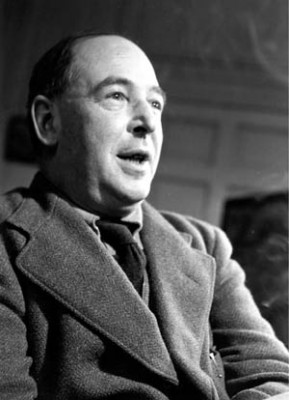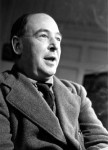This is Part 1 of a 4-Part series by Tyson Phillips on C.S. Lewis and Narnia. Tyson and his sister Tammy grew up in the Midwest. Tyson and his family now live discreetly on the West Coast, very near a large orchid tree.
If you would like to write a guest post for this blog, check out the guidelines here.

Humming Birds and Star Ships
As I settled into my lounge chair just below a wall of blooming passion vines on that sunny late autumn afternoon, I felt something alight on my arm. It was my friendly backyard hummingbird, or “Harry” as I usually referred to him.
“Harry, are you planning to spend this winter living in my back yard, like you did last winter? Why don’t you fly south with the other hummingbirds?”
When I sat in my lounge chair in my back yard to read, as I did almost every day, Harry would appear and sit nearby, or occasionally would sit on my arm for a few minutes.
When I casually mentioned this to an acquaintance, I immediately knew that she did not believe me. I had “crossed the line,” mentioning something she had never experienced and had never heard of this happening to someone else. She did not believe it was possible to have a hummingbird sit on one’s arm.
On another occasion, a good friend told me about regularly seeing unusual objects in the sky of the remote area where he lived. He sometimes saw them in the late afternoon, but most often after dark. One evening just after sunset, as he drove down a winding, abandoned country road, one of the objects came down from the sky and landed in an open space near him. He drove even closer.
“You’re the only person I’ll ever tell what I saw and what happened after I drove up by it. I’ll never tell anyone else, because they’ll think I’m crazy.”
True to his word, he has never told anyone else and I doubt he ever will. He is certain no one will believe him, which would affect his credibility in the community in which he lives and works.
“Nevertheless, it happened.” He adds. “I’ve decided there’s really no reason to tell my story to anyone. I guess I’m telling it to you because I know you don’t think I’m crazy and I know you’ll keep your mouth shut.”
Fiction Is More Believable
 What if?
What if?
What if I were a prestigious Oxford don, a professor of English literature, a well-known author, and an authority on religion who repeatedly had some most unusual, unbelievable experiences? Would I tell anyone? If I decided to tell someone, might I consider changing some of the details and telling my stories as “fiction”?
In the midst of my tale, the real story would be hidden. I must be careful not to tell too much, lest anyone find what I stumbled across. Could they find it also? That was unlikely. But I must not take that chance. So I would write my stories as fantasy, children’s literature, not intended to be taken as factual.
Is there any possibility that Lewis’ tales had any basis other than his imagination? Lewis himself has said that his stories did not come from his imagination. He said that he “saw pictures” and wrote what he saw (Of Other Worlds,32, 42). Exactly what did he mean when he said that his stories were based on the things he saw in his head? Did that mean he only imagined them, or did it mean more?
Could one “prove” my friend’s story about the object he saw come down from the sky? Probably not. Similarly, even if Lewis’ stories were more than pure fiction, could anyone prove it, or disprove it?
Anyone Want to Ride in a Star ship?
Suppose I have a vehicle that is capable of traveling vast distances in short periods of time, a “star ship” of sorts. Suppose that I show up at your house late tonight, and invite you to take a ride with me in my star ship. You would probably be convinced that I indeed have such a vehicle. But would your experience convince anyone else who themselves had not seen the star ship up close and who had not taken a ride in it to a distant galaxy?
Since neither I, nor my friend nor C. S. Lewis will be showing up in person at your house tonight to give you a ride in our star ships, perhaps you might be interested in indulging us to tell you our stories. You will decide what you think we might mean when we say that we are writing “what we have seen in our head”.
Before I tell my stories, however, perhaps we should think a bit about those of Clive Staples Lewis, the pre-eminent English author of the twentieth century. Where indeed did Lewis get those stories? – From an overactive imagination, from an overactive dream life or from the land of Narnia itself? Might there be more to his stories than first meets the eye?




Leave a Comment or Question